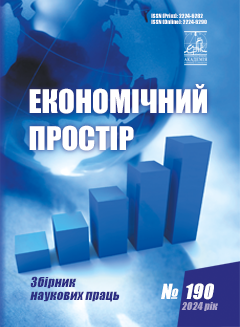ЕКОНОМІЧНА КОМПЕТЕНТНІСТЬ У РОЗВИТКУ ПРОФЕСІЙНОЇ МАЙСТЕРНОСТІ МАЙБУТНЬОГО ПЕДАГОГА
Анотація
В статті обгрунтовано роль економічної компетентності у розвитку професійної майстерності майбутнього педагога. Схарактеризовано економічну компетентність як особливий тип організації знань, умінь, спрямованих на економічну діяльність, які дозволяють особистості вирішувати проблеми та виконувати типові економічні завдання, що виникають у реальних життєвих ситуаціях. Визначено, що змістом економічної компетентності є: здатність до аналізу та синтезу економічної інформації; здатність застосовувати економічні знання практично; здатність адаптуватися до нових економічних ситуацій; системне розуміння перенесення знань (системна компетенція); інноваційні здібності; модерація (здатність керувати групою колег, партнерів за допомогою адміністративно-управлінських методів); здатність до інтеграції, спонукання висловлювати різні думки та підходи; здатність до стимулювання креативної економічної поведінки. Виявлено групи компонентів у структурі економічної компетентності майбутнього педагога: фундаментальні (базові), функціональні (ключові) та практичні, що є системною єдністю. Зроблено висновок, що процес формування професійної майстерності орієнтований на розвиток особистісно-творчого потенціалу майбутніх педагогів, накопичення ними досвіду взаємодії та спілкування при включенні в реальні умови життєвого простору. Сформована економічна компетентність сприяє розвитку у майбутнього педагога аналітичних вмінь, навичок оцінки стану господарської бази, здібностей до проектування, забезпечуючи конкурентоспроможність, адаптаційність, мобільність до сучасних ринкових відносин та реалізації соціально-економічних аспектів педагогічної діяльності.
Посилання
Власюк І.В. Ділова гра як засіб формування професійної термінології економістів. Сучасні інформаційні технології та інноваційні методики навчання у підготовці фахівців: методологія, теорія, досвід, проблеми: зб. наук. пр.; редкол.: І. А. Зязюн (голова) та ін. Київ-Вінниця : ТОВ фірма «Планер», 2012. Вип. 29. С. 299–304.
Концепція розвитку економічної освіти в Україні: ріш. колегії М-ва освіти і науки України від 04.12.2003 р. (протокол № 12/7-4).
Ковальчук Л. Культура мислення, інтелектуальна культура, розумова культура у контексті дослідження проблеми формування культури професійного мислення майбутніх педагогів. Вісник Львівського університету. Серія педагогічна. 2023. Вип. 38. С. 115–128.
Освітньо-професійна програма «Професійна освіта (Економіка)» першого (бакалаврського) рівня вищої освіти. Галузь знань 01 Освіта/Педагогіка. Спеціальність 015 Професійна освіта (Економіка). Мукачівський державний університет. 2023. https://msu.edu.ua/wp-content/uploads/ (дата звернення: 19.03.2024).
Поясок Т.Б. Система застосування інформаційних технологій у професійній підготовці майбутніх економістів : монографія / за ред. док. пед. наук, проф. С.О. Сисоєвої. Кременчук : ПП Щербатих О.В., 2009. 348 с
Реброва Г.О. Формування економічної культури майбутніх учителів гуманітарних спеціальностей засобами акмеологічних технологій. Автореферат дисертація на здобуття наукового ступеня кандидата педагогічних наук за спеціальністю 13.00.04 – теорія і методика професійної освіти. Державний заклад «Південноукраїнський національний педагогічний університет імені К. Д. Ушинського», Міністерство освіти і науки України. Одеса, 2020. 24 с.
Товканець Г.В. Категорії і функції вищої економічної освіти. Материали за VIII международна научна практична конференция «Динамиката на съвременната наука – 2012», 17–25 юли 2012 г. – Том 6. Педагогически науки. София : «Бял ГРАД-БГ» ООД, 2012. С. 23–27. http://www.rusnauka.com/21_DSN_2012/Pedagogica/2_114645.doc.htm (дата звернення: 20.03.2024).
Харченко І.І. Педагогічні умови формування у майбутніх фахівців з економіки культури професійної комунікації. Фізико-математична освіта. 2020. Випуск 1(23). С. 134–138.
Vlasiuk I. V. (2012) Dilova hra yak zasib formuvannia profesiinoi terminolohii ekonomistiv. [Business game as a means of forming the professional terminology of economists]. Suchasni informatsiini tekhnolohii ta innovatsiini metodyky navchannia u pidhotovtsi fakhivtsiv: metodolohiia, teoriia, dosvid, problemy: zb. nauk. pr.; redkol.: I. A. Ziaziun (holova) ta in. Kyiv-Vinnytsia: TOV firma «Planer», vol. 29. рр. 299–304.
Kontseptsiia rozvytku ekonomichnoi osvity v Ukraini: rish. kolehii M-va osvity i nauky Ukrainy vid 04.12.2003 r. (protokol № 12/7-4).
Kovalchuk L. (2023) Kultura myslennia, intelektualna kultura, rozumova kultura u konteksti doslidzhennia problemy formuvannia kultury profesiinoho myslennia maibutnikh pedahohiv. [ Culture of thinking, intellectual culture, mental culture in the context of the study of the problem of formation of the culture of professional thinking of future teachers] Visnyk Lvivskoho universytetu. Seriia pedahohichna.. vol 38. рр. 115–128.
Osvitno-profesiina prohrama «Рrofesiina osvita (Ekonomika)» pershoho (bakalavrskoho) rivnia vyshchoi osvity. [Educational and professional program "Professional Education (Economics)" of the first (bachelor's) level of higher education]. Haluz znan 01 Osvita/Pedahohika. Spetsialnist 015 Profesiina osvita (Ekonomika). Mukachivskyi derzhavnyi universytet. (2023). Available at: https://msu.edu.ua/wp-content/uploads/ (accessed March 19, 2024).
Poiasok T. (2009) Systema zastosuvannia informatsiinykh tekhnolohii u profesiinii pidhotovtsi maibutnikh ekonomistiv : monohrafiia [System of application of information technologies in professional training of future economists: monograph] / za red. dok. ped. nauk, prof. S. O. Sysoievoi. Kremenchuk : PP Shcherbatykh O.V, р. 348. (in Ukrainian)
Rebrova H. O. (2020) Formuvannia ekonomichnoi kultury maibutnikh uchyteliv humanitarnykh spetsialnostei zasobamy akmeolohichnykh tekhnolohii. [Formation of the economic culture of future teachers of humanitarian specialties by means of acmeological technologies]. (Ph.D. Thesis). Odesa. P. 24.
Tovkanets H. V. (July 17-25, 2012) Katehorii i funktsii vyshchoi ekonomichnoi osvity. [Categories and functions of higher economic education ] Proceedings of the Materyaly za VIII mezhdunarodna nauchna praktychna konferentsyia «Dynamykata na sъvremennata nauka – 2012». Sofyia: «Bial HRAD-BH» OOD,. рр. 23–27. Available at: http://www.rusnauka.com/21_DSN_2012/Pedagogica/2_114645.doc.htm (accessed March 20, 2024).
Kharchenko I. I. (2020) Pedahohichni umovy formuvannia u maibutnikh fakhivtsiv z ekonomiky kultury profesiinoi komunikatsii. [Pedagogical conditions for the formation of professional communication culture among future specialists in economics] Fizyko-matematychna osvita - Physical and mathematical education. vol. 1 (23), рр. 134–138.



